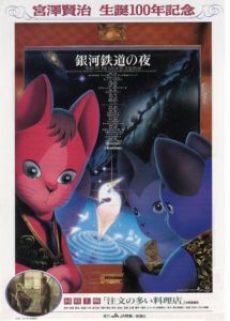
AKA Kenji Miyazawa’s Night on the Galactic Express
Starring Mayumi Tanaka, Chika Sakamoto, Chikao Ohtsuka, Hidehiro Kikuchi, Junko Hori
Directed by Gisaburō Sugii
If you’ve been around this site for a few years, you may recall a film I reviewed a while back called Spring and Chaos. It was a biopic about Kenji Miyazawa, Japan’s foremost literary figure. This film is the adaptation of Miyazawa’s most famous book, Night on the Galactic Railroad. And these two films have more than a passing connection. Now that I’ve finally seen Night on the Galactic Railroad, I can see just how strongly it influenced Spring and Chaos. That later film is as much a tribute to this film as it is to Miyazawa himself.
Watching this film also drove home just how indebted the Galaxy Express 999 series is to Miyazawa’s original novel, though this film’s adaptation of the book came out quite some time after Galaxy Express. In fact, the two titles are nearly identical, with “galaxy express” and “galactic railroad” simply being alternate translations of “ginga tetsudō.” Any way you slice it, Miyazawa’s little fable has had a massive influence on anime and manga, to say nothing of what it did to Japanese literature.
And just like Spring and Chaos, the pacing is pretty damn sluggish. It takes over half an hour just for them to get on the train, which is the entire point of the film. It was one hell of a relief to finally get the plot going after all that time. I suppose that first chunk is there to flesh out Giovanni’s life and environment, but a lot of it seemed unnecessary. I think of it as meticulous. Every action is deliberate and drawn out. It’s a similar sense to what you get from watching an old Hollywood film that doesn’t cut as quickly as modern films do. It also feels a bit similar to Studio Ghibli films and the way that they pay a lot of attention to minor, everyday activities. But as much as I want to complain about the movie being too slow and plodding, that’s exactly what is necessary to create its mystery-filled mood, and really, the film isn’t so much about the plot as it is about the style.
The animation is quite good, but in a way that doesn’t really stand out. It doesn’t call attention to itself, but rather to the imagery on display. That might sound weird since the imagery is portrayed through the animation, but I feel like there’s a distinction here that the film is utilizing. The glint of a searchlight on the water didn’t make me think, “Wow, that was some good animation!” Rather it made me think, “Wow, that was a really cool visual!” It takes a bit of looking to see that the animation is actually pretty fluid and graceful, too.
In the end, Night on the Galactic Railroad is a great film. I really do wish that first half hour had gone by a lot faster, but aside from that, I really can’t say anything bad about it. It’s beautiful and thoughtful in a unique way, so definitely give it a look if you’re in the mood for some philosophical fair. And who knows, maybe now I’ll finally understand just what the hell was going on in Spring and Chaos if I ever wind up watching that movie again.
